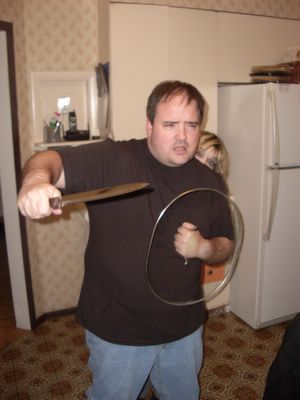Wow, over a month since I've last blahged. Nothing much to say here except I didn't want to let December go by without at least one post...
Sylvia and I just got back from seeing the Borat movie, and I have to say, while I laughed at some bits, the film left a bad taste in my mouth. And probably not for the reasons most people think. I wasn't offended by the potty humour, nor by the faux racism. I can't quite put my finger on what exactly bothered me about the film, to be honest.
Maybe I'm just tired of the "reality television" artifice that's sweeping popular culture. Films and television shows in the Borat mold are being sold as glimpses into the soul of ordinary people, but it's the old problem of anthropologists - the observer effect distorts reactions. The presence of the camera can't help but have a huge impact on the way people behave, but this film and others like it don't acknowledge the problem. And I guess that seems a little dishonest to me. I'd much rather see a straight comedy, or a straight documentary (recognizing that documentaries manipulate reality as well).
Anyway, 2007 awaits...
Total Pageviews
Sunday, December 31, 2006
Farewell 2006
Labels:
Borat,
Film,
Holidays,
popular culture,
Reviews
Thursday, November 16, 2006
The End of a 22 Year Journey
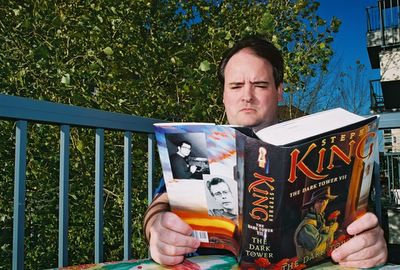
I set up my camera to shoot a photo of me just as I was finishing Stephen King's Dark Tower series. Started the series in my teens, finished in my thirties. What a long, strange trip it's been.
The Speculative Fiction Canon

Examine the canon.
About a month ago Leslie asked me to put together a reading list of important genre works for her students. So, based on my own experience, I came up with the following list of important genre novels, collections, and critical works. I hope that it might serve as a resource to any of my readers unfamiliar with genre fiction, or with those who are looking to explore any classics they may have missed.
Naturally, this list is far from authoritative. If I've missed any critical works (and there's little doubt I have), please feel free to make a note in the comments section.
Non-Fiction
The following books examine the history, meaning and impact of SF lit:
Trillion Year Spree: The History of Science Fiction, by Brian Aldiss with David Wingrove
The World Beyond the Hill: Science Fiction and the Quest for Transcendence by Alexei and Cory Panshin
The Dreams Our Stuff is Made Of: How Science Fiction Conquered the World, by Thomas M. Disch
Each of these comprehensive works has plenty of value for anyone interested in taking a deeper look at SF's roots. These are academic texts, but quite readable and interesting.
Fiction
Here's a list of what I consider the most important books in the science fiction genre, in roughly chronological order:
Frankenstein, by Mary Shelley. The earliest story that could be considered "true" SF, with its focus on the possible consequences of scientific progress. The creature's creation is explicitly linked to science, not magic, an important distinction between SF and Fantasy lit.
The War of the Worlds and The Time Machine, both by H.G. Wells. The first alien invasion story, the first time travel story, which became subgenres within SF.
Journey to the Centre of the Earth and 20,000 Leagues Under the Sea by Jules Verne. Prototypical stories about exploring new worlds, though in this case they lie hidden on our own world. Leagues is most famous for introducing Captain Nemo and his amazing submarine, the Nautilus.
I would describe Shelley, Wells and Verne as the European grandparents of an essentially American art form (in spirit, if not always in fact). So let’s get into the first important American authors…
A Princess of Mars, The Gods of Mars, The Warlord of Mars, all by Edgar Rice Burroughs. There are 11 novels in Burroughs’ “John Carter of Mars” series, but these three will serve as an introduction to another subgenre within SF, the high adventure story, rife with many of the features that would later become SF stereotypes: ray guns, gorgeous, scantily clad alien women, hypermasculine heroes, exotic aircraft, and a solid dose of plausible-sounding science to make the whole thing work. I’ll save mention of Burroughs’ most famous creation, Tarzan, for the fantasy section.
Foundation, Foundation and Earth, and Second Foundation by Isaac Asimov. Asimov is one of three recognized giants of SF, along with Arthur C. Clarke and Robert Heinlein. These novels lay the foundation (if you’ll forgive me) for another subgenre, that revolving around intergalactic empires.
I, Robot by Isaac Asimov. This is a short-story collection that includes the first appearance of the famous Three Laws of Robotics. Robots are a major theme in SF, and this is the robot bible.
The Martian Chronicles, Fahrenheit 451, R is for Rocket, I Sing the Body Electric, all by Ray Bradbury. Bradbury is widely respected even outside the genre for the nostalgic, melancholy quality of his prose, though some have criticized it as syrupy. (I disagree.) The Martian Chronicles is one of the earliest and most important books in the SF tradition of mythologizing Mars. Fahrenheit 451 is a major dystopian novel, and the other books listed are short story collections that include some widely anthologized works.
Childhood’s End, Rendezvous with Rama and The Collected Stories of Arthur C. Clarke, by Arthur C. Clarke. The first is an early novel about human transcendence; the second, one of the first novels featuring a BDO (Big Dumb Object, a cosmic MacGuffin); the third is a very comprehensive collection of Clarke’s short stories.
Starship Troopers, The Puppet Masters and Stranger in a Strange Land by Robert A. Heinlein. I don’t care for Heinlein much myself, but there’s no denying his influence. Three very different treatments of human contact with alien life, from the insidious to the benign.
Slan, by A.E. Van Vogt. This is one of the first treatments of the superhuman in SF. Canadian author.
The Stars My Destination and The Demolished Man by Alfred Bester. The first novel is about teleportation; the second, telepathy. These two books established many of the conventions of these particular themes.
1984, by George Orwell. Yes, this is SF; Oceana's iron-fisted control of its people would be impossible without speculative advances in technology (telescreens, anyone?). One of the major dystopias.
Brave New World, by Alduous Huxley. Another important dystopia.
Solaris, by Stanislaw Lem. A living planet and ordinary people in space. Lem's Futurological Congress is also important, and one of the prototypical SF satires.
The Forever War, by Joe Haldeman. Military SF through the lens of the Vietnam War.
Dangerous Visions, edited by Harlan Ellison. Probably the most important anthology of the New Wave movement, which hit SF in the late 60s.
The Beast that Shouted Love at the Heart of the World and The Essential Ellison, by Harlan Ellison. SF’s most respected (and controversial) writer of short stories.
The Left Hand of Darkness and The Dispossessed, by Ursula K. LeGuin. Sexual and interplanetary politics.
Flowers for Algernon, by Daniel Keyes. This could be the most personal of all SF novels, focussing as it does on the effect of a dangerous experiment on a single human being, told from that individual’s point of view. Some critics prefer the short story the longer work is based upon.
The Science Fiction Hall of Fame Volume One, 1929-1964, edited by Robert Silverberg. A must-have collection of the genre’s most influential short stories, up to the time of publication. Recently back in print.
The Science Fiction Hall of Fame Volume Two A/Two B: The Greatest Science Fiction Novellas of All Time, edited by Ben Bova. Same as above, but with novellas rather than short stories.
Dying Inside, by Robert Silverberg. Perhaps the best novel since The Demolished Man on the implications of telepathic powers, in this case their effect on a university professor who finds he is beginning to lose them.
The Man in the High Castle and Valis, by Philip K. Dick. An important alternate history, and a psychedelic, postmodern romp about the true nature of reality.
Dune, by Frank Herbert. Drugs, family drama and transcendence on a world of sand.
Way Station, by Clifford D. Simak. The downside of immortality.
Stand on Zanzibar, by John Brunner. An important novel on the threat and implications of overpopulation.
334 and Camp Concentration, by Thomas M. Disch. Two novels that focus on the social and economic pressures that conspire to make us less than human.
Slaughterhouse-Five, by Kurt Vonnegut. Time travel as a means of examining the horrors of the human condition.
A Wrinkle in Time, by Madeline L’Engle. Well-crafted kid-lit SF exploring themes of otherworldly possession and tesseracts.
Where Late the Sweet Birds Sang, by Kate Wilhelm. Major novel about human cloning and environmental catastrophe.
Berserker, by Fred Saberhagen. Robotic, self-perpetuating death machines scour the galaxy, wiping out all life forms. Only the similarly warlike human species has a hope of brining the Berserker rampage to an end. Important for its treatment of artificial intelligence, and the implications thereof.
More Than Human and To Marry Medusa (also published as The Cosmic Rape), by Theodore Sturgeon. Two great novels about humanity’s future as a gestalt being. To Marry Medusa in particular had a profound effect on me, because it showed that even the most loathsome specimen of humanity has something important to contribute to the welfare of the species.
Her Smoke Rose Up Forever, by James Tiptree, Jr. (Alice Sheldon). Short story collection by a female author who wrote very successfully as a man for most of her career.
The Dream Master and Damnation Alley, by Roger Zelazny. A novel on the nature of reality, another describing a post apocalyptic future.
Moving on down the line to some late-period SF:
Blood Music, by Greg Bear. The first novel to tackle, at least tangentially, the topic of nanotechnology.
Timescape, by Gregory Benford. A later time-travel novel – late enough to examine the implications of time travel technology more seriously, and with more basis in reality, than earlier examples of the form.
Ender’s Game, by Orson Scott Card. A wildly popular coming-of-age/alien invasion novel. Criticized in some quarters for its glorification of violence and dismissal of the quality of mercy.
The Handmaid’s Tale, by Margaret Atwood. A respected mainstream author writes an SF novel (though she denies that categorization). Another powerful dystopia, this time from a female perspective.
Doomsday Book and To Say Nothing of the Dog, by Connie Willis. Willis is one of the most respected and award-winning SF writers of the 80s and 90s, and she's in top form here.
Beggars in Spain, by Nancy Kress. A story about obligation told through the lens of an emerging race of human superbeings.
A Fire Upon the Deep and A Deepness in the Sky by Vernor Vinge. Complex novels about the nature of intelligence and the so-called technological singularity, one of the more recent “big ideas” in SF.
Red Mars, Green Mars, and Blue Mars, by Kim Stanley Robinson. “Hard” SF treatment of the terraforming of Mars, and the scientific and social implications of same.
The Speed of Dark, by Elizabeth Moon. A great thematic follow-up to Flowers for Algernon, this time about an autistic man who is presented with the opportunity to become “normal.”
I'm not as familiar with the fantasy genre as I am with science fiction, but here are a few of the milestones:
The Lion, the Witch and the Wardrobe by C.S. Lewis. If you can get past none-too-subtle Christian allegory, Lewis' tale of childhood wonder and its sequels are essential reading. An excellent example of one of the genre's most important themes: ordinary people thrust into an extraordinary world.
The Mists of Avalon, by Marion Zimmer Bradley. The Arthurian legend told from the perspective of the female characters in the tale.
Silverlock, by John Myers Myers. The hero is torn from his mundane life into the Commonwealth of Letters, where he encounters the settings and characters of many major works of literature.
The Lord of the Rings trilogy, by J.R.R. Tolkien. Everything in fantasy supposedly goes back to this, but I haven’t read it..!
Tigana, by Guy Gavriel Kay. Canadian author, writer of superior late-period fantasy.
Nobody’s Son and The Night Watch, by Sean Stewart. Two sentimental favourites by an Edmonton author. Nobody's Son is particularly charming; it explores what happens after "happily ever after," and it's a story well worth exploring by anyone who enjoys seeing a timeless formula turned on its head.
The Dark Tower series, by Stephen King. Part western, part SF, part fantasy, part metafiction. Peters out toward the end, but the early going is pretty amazing.
Tarzan of the Apes, by Edgar Rice Burroughs. Tarzan, Mickey Mouse, and Superman have been called the three most widely recognized icons of popular culture in modern history. After reading Tarzan, it's easy to see why the story remains powerful; it's a mythic tale of man's relationship with nature, his primal self, and the corrupting influence of civilization. In Burroughs' mythology, life as a savage is far from nasty, brutal, and short; it's a romantic wonderland of adventure, carefree sex, and the epic struggle of good versus evil, in all its various and sundry forms.
The definitive SF canon hasn't yet been determined; the genre, barely a century old, is still too young to properly evaluate. But I hope that the works I've listed will give interested readers a place to start exploring.
Labels:
Books,
Leslie V.,
Reviews,
science fiction,
Stephen King
Tuesday, November 14, 2006
The Adventures of Dr. Cerebellum, Evil Brain in a Jar
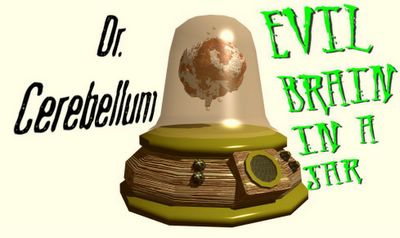
Illustration by Colin Dunn
Prologue: The Long, Long Night of Dr. Cerebellum
One day on a beach in the south of France, Philippe Gagnon dug up a supervillain.
Of course, he didn’t know it was a supervillain. His metal detector beeped; Philippe dug; and so sealed his fate.
“Mon Dieu! C'est un cerveau dans une fiole!*” he gasped, brushing wet sand off the artifact as he knelt beside his find. It was about 30 cm tall, and perhaps half that in width. The bizarre find consisted of a glass dome mounted on a stand of ornately carved wood, inlaid with bronze finishing, a number of buttons and lights, and a speaker grille. The dome was filled with a bubbling amber fluid. A brain floated inside the amber, bobbing gently with any movement of the jar.
“Macabre!” said Gagnon's companion, a lovely filly called Mignon. She leaned over Philippe's shoulders, eyes wide.
Before either could speak again, a stygian darkness enveloped the couple and their grotesque treasure. From the dome came a voice, harsh with static, speaking words they did not understand:
"I LIVE!"
*”My God! It is a brain in a jar!”
Chapter 1: Diminished Expectations
In a lavishly furnished office deep beneath the streets of Paris, lacquered fingernails, blood red, scraped silently across the smooth curve of a glass jar mounted on a pedestal of oak and brass. The disembodied brain of Dr. Cerebellum floated within, bobbing gently in a tiny sea of amber nutrient fluid.
"Don't torture me with a touch I cannot feel," said Dr. Cerebellum, his voice hissing from the speaker grille fixed at the base of his jar. Strumpet, his assistant, obediently pulled her hand away. How she ached to penetrate the glass wall that denied her fingers, her lips, the chance to brush against her idol's glorious brain! One day, she thought, you will feel the naked caress of my body against your living brain, my love. You deny the pleasures of the flesh, lost to you so many decades gone...but I will show you what you have forgotten...I will...
"Strumpet," Dr. Cerebellum said, "Dr. Verlucci will arrive soon. Is Dolt ready?"
Strumpet shook herself from her reverie, her blonde curls dancing upon her shoulders. "Of course, Doctor."
A metallic chuckle echoed from the speaker grille. "Good. With Verlucci out of the way, I'll be able to seize control of his entire organization. With the Minions of C.H.A.O.S. at my command, none shall stand before me!"
Suddenly, Dr. Cerebellum's slightly less competent lackey, Dolt, burst in through the door.
"He's here, sir!" Dolt shouted breathlessly, needlessly waving his arms over his head.
"Send him in, Dolt." Dolt nodded enthusiastically and retreated.
A moment later, Dr. Verlucci, self-styled Cardinal of Crime, hobbled into the office, leaning heavily on a steel walker. His aged countenance was fissured by decades of bitter spite, his spine twisted with a century's worth of vitriol. Strumpet moved to help the old man to a seat, but the venerable villain waved her off.
"Keep away from me, you tart!" he bellowed. "I'm not so old that I can't stand for the few seconds this meeting will take."
Strumpet hid her anger behind a sweetly professional smile. "Of course, Doctor."
"What's this all about, Cerebellum? I'm a busy man - got Paladins of O.R.D.E.R. to kill - trains to derail - candy to take from babies!"
"My dear fellow," replied Dr. Cerebellum, "I sympathize. Evil is a harsh, demanding mistress, and there are only so many vile deeds one can perform in a day."
"Get on with it, you freakish small-timer!"
"Very well. I'll make it plain: I wish to assume command of the Minions."
Dr. Verlucci cackled. "You? A helpless brain in a jar? A ghoulish monstrosity straight out of a drive-in movie? Fool! Commanding the Minions requires a towering intellect...a fiendish capacity for depravity...a complete inability to feel remorse or compassion! Not to mention an able body! You delude yourself, Doctor! And worse - you have wasted my time. Do not think you can escape punishment for this affront."
"Your response was not unexpected, Doctor Verlucci. I had hoped that you would be more...reasonable. Dolt," Dr. Cerebellum continued, "You may proceed."
Dolt returned, a small blue pistol clenched in his right hand.
"What's this?" Verlucci snorted. "You can't kill me, you fool. You'll have a horde of Minions on you faster than you can blink. Well, faster than you could blink if you had eyes."
Strumpet grinned evilly as her master's voice boomed from the speaker grille. "My dear Doctor! You overestimate the loyalty of your Minions! Who do you think asked me to arrange this meeting? Only your most dedicated lieutenants! Ha ha ha ha ha!"
Dr. Verlucci gaped. "But...Albertolini...Soggy Belly..? They would never betray me!"
Verlucci couldn't take his eyes from the barrel of Dolt's weapon. He began to realize he'd made a critical error, and raised his hands in feeble supplication.
"No...don't!"
"Now, Dolt," said Dr. Cerebellum.
Dolt pulled the trigger. A green glow enveloped Dr. Verlucci, then faded. The mad scientist blinked. "What have you done to me?" he whispered.
"Dolt has just tested my newest invention: the C.H.A.O.S. Gun. That is, the Collapse His Atoms, Or Shrink, Gun. A 'small-timer,' am I? Well, Dr. Verlucci, soon you will be the small-timer...literally!"
Dr. Cerebellum and his henchmen broke into unrestrained, diabolical laughter. Dr. Verlucci's stature began to diminish, clothes, walker, and all, his voice shrinking in tandem.
"You'll pay for this, Cerebellum! You'll...payyyyyy..."
But when Verlucci shrank to a mere five centimeters in height, Strumpet raised her right foot and then brought it down upon his shrunken head, crushing him like a bug. A grisly pool of blood and gristle spread across the carpet.
"Ewwwww," Dolt moaned, clutching his stomach. "I - I think I'm going to puke!"
Strumpet made a low, mewling sound of pleasure as she ground Dr. Verlucci's remains into the floor. A rapturous smile lit up her beautiful features.
"Well done, my dear. I'd say you've crushed all his dreams and aspirations. Ha ha ha! Dolt, clean up the mess."
"Yes, sir," Dolt replied glumly.
Strumpet kicked off her shoes and collapsed languidly onto the couch, stretching, her lithe form arching. "You've done it, Doctor," she cooed.
"Hmph. Yes. But this is only the beginning. With my hold on the Minions consolidated, all that remains between me and world domination are those idealistic fools, the Paladins of O.R.D.E.R. Once Alter Ego and his band of stooges are destroyed, I shall at long last realize my mad dream of conquest."
"Will you use the shrink ray on them? I'd love to crush those sanctimonious Paladins beneath my heels..."
Dr. Cerebellum's artificial voice box simulated a derisive snort. "Bah. Perhaps. But a simple shrinking death is too quick for them. Their demises must be more fiendish, more diabolical. As for the shrink ray - I shall use it to shrink beautiful women, who I will then put in birdcages for my amusement. Ha ha ha!"
Strumpet couldn't help herself; she rushed up to Dr. Cerebellum's jar and planted a kiss at its apex, leaving a greasy smear of lipstick.
"Oh, really, Strumpet. I wish you wouldn't do that. It's so undignified."
The Adventures of Dr. Cerebellum, Evil Brain in a Jar, Chapter 2: Minute by Minute
The dank catacombs beneath the Paris Opera House dripped with slime, a dark reflection of the glittering City of Lights above. Through this maze of grime and scum skulked Big Jim Spittolini, thug for hire, and his reluctant companion, Shrieking Groaner, smalltime supervillain.
"I can't believe I'm walking in this stuff," Shrieking Groaner said with a groan. His official supervillain boots, once a shiny red, were caked with nauseating goop.
"Shaddup," Spittolini barked, "We're almost there. I'm sick of your whining, Shrieking Groaner. It's always shrieking over this, groaning over that! Why, I've got half a mind to plug you right here and leave you for the rats."
Shrieking Groaner shrieked, horrified, his lower lip quivering in fear. Spittolini rolled his eyes and pressed on, rounding a curve to find the doorway to Dr. Cerebellum's Sanctum Sanctorum. "We're here, Groaner. Pull yourself together - time to meet the new boss."
Spittolini pushed open the door and blinked at what he saw – a sumptuous anteroom, far better than the digs Dr. Verlucci had enjoyed. Disembodied brain or not, Dr. Cerebellum evidently had taste.
Dolt, one of Cerebellum’s personal assistants, rose from behind his desk to greet Spittolini and Groaner.
“If you’ll come this way, gentlemen,” Dolt said, ushering them through a set of oak double doors and into Dr. Cerebellum’s offices. The sinister brain in a jar was there, along with his associate, Strumpet.
“So – you’ve arrived,” Cerebellum said.
“We’re here,” Spittolini replied. “So is the job done?”
Strumpet said, “Dolt washed Dr. Verlucci's remains down the drain a few minutes ago. The remains of his brains flow mainly down the drains! Ha ha ha!”
Spittolini nodded. “And our money?”
“Deposited into your Swiss accounts, as agreed. I assume that along with your loyalty, I’ve bought your friends?”
“Yeah, yeah. Verlucci wasn’t that popular, trust me. If you can deliver the goods – wealth, power, and sex – then you won’t get any trouble from any of the Minions.”
“We’re easy to please!” said Shrieking Groaner, barely suppressing a shriek of delight and a groan of ecstasy.
“Excellent. Now then – doubtless you’re wondering just how I plan to lure the Paladins to their doom.”
"It had crossed our minds," Spittolini replied laconically.
"It's simple. We'll take a stroll and shrink the Eiffel Tower. Then, when the Paladins show up to investigate, we'll shrink them, too."
Strumpet said, "But boss, I thought you were only going to use the shrink gun to shrink beautiful women and put them in birdcages."
"You have a shrink gun?" Spittolini interrupted. Verlucci ignored him.
"I changed my mind. When you crushed Dr. Verlucci beneath your spike heel, Strumpet, it aroused…feelings…that I haven't experienced for quite some time. To see that do-gooder Alter Ego crushed in a similar fashion would bring me great satisfaction."
"When do you intend to carry out this plan?" Spittolini asked.
"Immediately," the mad brain replied, "And you, Mr. Spittolini, will play a very important role. Strumpet, if you please…"
Strumpet took Dr. Cerebellum into her arms and lifted the jar off its pedestal. She raised the jar high, and as Big Jim gaped, she carefully planted it on his head. Before Spittolini could react, a series of clamps snapped out of the bottom of Dr. Cerebellum's base and tightened around the shocked gangster's skull.
"OW! What the hell is this?" he cried, reaching up instinctively to try to pull the brain in a jar from his head. It was no use; the jar was clamped on tight.
"Don't worry, Spittolini. The clamps aren't tight enough to cause any lasting damage, though they may give you a bit of a headache. I assure you that I won't put any undue pressure on your brain."
"It feels like my head is stuck in a vise!" Spittolini complained. "What the hell are you planning?"
"My unusual appearance means that I would draw undue attention were I to prowl the streets of Paris without some form of disguise. You, my dear fellow, will serve as part of that disguise. Strumpet, the hat, if you would."
Strumpet opened a closet and produced a tall, black, stovepipe hat. She approached Spittolini and the doctor and pulled the stovepipe over Dr. Cerebellum’s environmental jar. The doctor’s voice was muffled by the hat, but still audible: "I call it the C.H.A.O.S. hat - for 'Cleverly Hide All Obvious Synapses,’” he explained.
“Why do all our evil inventions and operations have to have some clunky C.H.A.O.S. anagram?” Strumpet grumbled. “’Change Height At Once Steroid,’ ‘Create Hideous And Odious Stench,’ ‘Conjure Ham And Onion Sandwich…’ Besides, it’s just a hat, for God’s sake, not some brilliant technological wonder.”
“You’re an effective operative, Strumpet, but you should cultivate your appreciation for Minion traditions. Dr. Verlucci was an overconfident fool, but he had a flair for villainy.”
"This is going to put one hell of a kink in my neck," Spittolini said, "How much does your stupid jar weigh?"
"Well, the total weight of my brain, the jar, the nutrient fluid, and the base puts me at a svelte 45 kilograms."
Spittolini groaned.
* * *
Some hours later, Dr. Cerebellum and a hand-picked (or brain-picked, since Cerebellum had no hands) team of Minions of CHAOS emerged from a manhole, blinking in the bright sunlight. They were a fearsome group: The rugged Spittolini and his disguised master, Cerebellum; the fatal femme, Strumpet; the oafish but obedient Dolt; and Shrieking Groaner, clutching in one hand the innocent-looking but cataclysmic Calamity Bagel. The Eiffel Tower waited heedlessly in the distance.
"Don't we need more agents than this if we're going to take on a team of Paladins? We don't know how many of their agents could show up, or which ones," Spittolini said. Shrieking Groaner agreed with a quiet, mournful groan.
"Bah! You display all the foresight and cunning of your erstwhile leader—which is to say, none. Whenever a crisis alert comes in to Paladin HQ, Alter Ego or one of his lieutenants sends in a recon team, usually composed of a small group of key agents: Naked Singularity, because of her ability to provide instantaneous transport to the scene, Bottle Dropper, because of his experience and keen observational skills, and Alter Ego himself, because he has an irrational credo about not sending his agents in where he won't go, etcetera ad nauseum. Alter Ego usually keeps his heavy hitters in reserve, so there's very little chance we need to worry about powerhouses like Paramount Importance or Dolt Man (no relation to Dolt)."
"I'm not related to Dolt Man!" said Dolt.
"Dolt, I already said the disclaimer," sighed Dr. Cerebellum, voice muffled by the CHAOS hat.
Just then, a rotund, balding man in a baker's apron came upon the Minions. He pointed and laughed at Spittolini. “C’est Monsieur Lincoln! Ha ha ha! Dans le grand chapeau!”
Spittolini grimaced. "I may not know how to speak French, but that guy is putting himself in Dutch with me! Hey, buddy - how'd you like a knuckle sandwich? With extra ketchup?"
"Fool!" Cerebellum barked within his hat, "No French chef worth his salt would sully a sandwich with ketchup!"
"But I like ketchup," Dolt whined.
"Silence! I tire of this idiotic banter. Shrink the tower and draw those putrid Paladins to their atomic doom!"
Strumpet raised the CHAOS gun, its barrel aimed directly at the iconic tower. With a squeeze of the trigger, she bathed the structure in weird green light, and the tower began to diminish. Cries of anguish rose from the streets of Paris:
"Quelle dommage! Le tour c'est petite!"
"Mon dieu! Je pense que je vous vomir!"
"Mon chapeau c'est dans le chateau!"
"Ou est le salle du bain?"
* * *
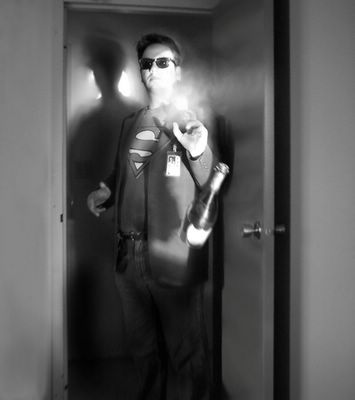
Bottle Dropper, by Jeff Shyluk
Moments later, in the stratospheric headquarters of the Paladins of ORDER, the heroic Bottle Dropper nearly dropped his bottle of beer as the Trouble Tingler zapped his plush leather chair, alerting him to activate the MegaScreen. He did so by slamming an open palm against a bright red button, and the gigantic (one might even say ostentatious) viewer hummed to life.
"Holy Smashamoley!" yelped Bottle Dropper. He watched in horror as the Eiffel Tower shrank to the size of one of those novelty Eiffel Tower pencil sharpeners or paperweights you might pick up at a sleazy tourist trap at that one casino in Las Vegas - you know, the one with the half-scale Arc de Triomphe (soon to be shrunk, dear readers; have no fear).
Bottle Dropper knew what he had to do. Pulling on his communications headset, he keyed an emergency alert signal into the computer:
"Calling all Paladins...Calling all Paladins..."
TO BE CONTINUED
Thursday, November 09, 2006
The Shot Not Taken
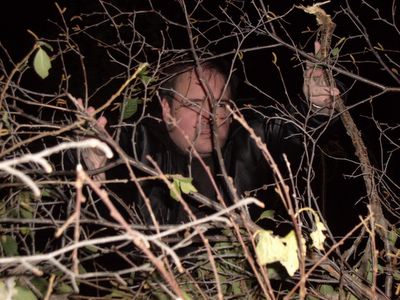
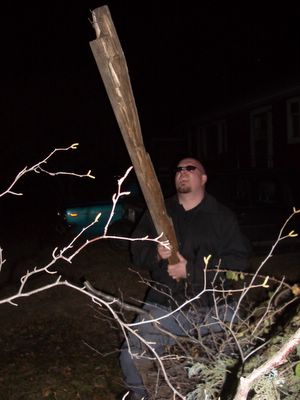
Two Woods converged in a scary grove,
And I thought that I would photo both
In a single frame, long I strove
To capture both in a single clove
To where they fooled in branches;
They would not obey, not playing fair
And having perhaps another aim
Or maybe they just didn't care
Were searching for some time to maim,
And both that evening equally strayed
In bushes their steps had squashed quite flat.
Oh, I thought I'd shoot them another time!
Yet knowing how Sean and Earl go on
I doubted if I would accomplish that.
I shall be boring you with this tale,
Talking across the back fence:
Two Woods converged in a scary grove, and I -
I missed the shot and now I cry,
And resorted to poetic flatulence.
Tuesday, October 31, 2006
Happy Hallowe'en!
Here's some arcane imagery to make this special night all the creepier.
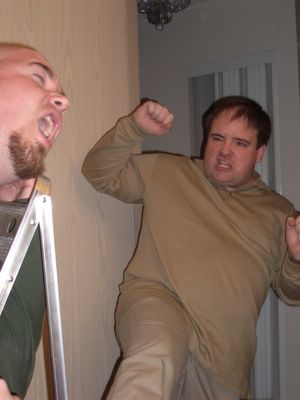
It's bad luck to walk under a ladder!
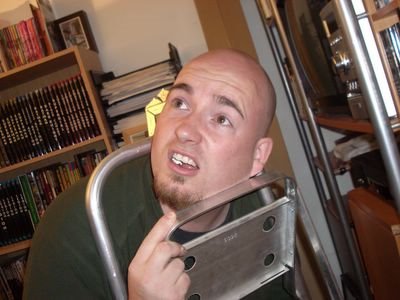
As Karen Black revealed in Trilogy of Terror, nothing is creeper than an action figure taken out of context.
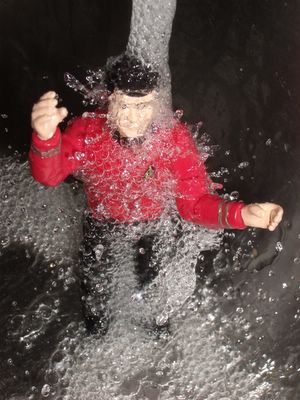
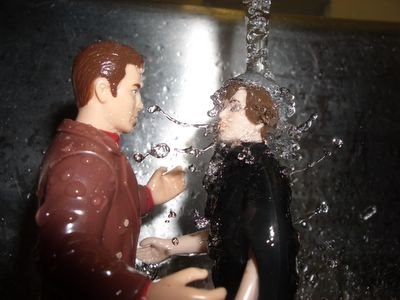
Sylvia and I carved another pumpkin this year.

Sylvia proudly displays this year's sacrfice.
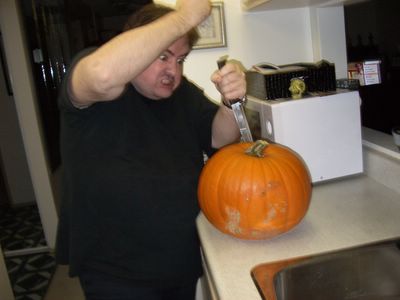
Muah hah hah hah hah
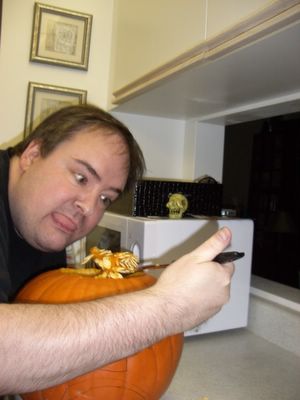
MMMM...BRAINS
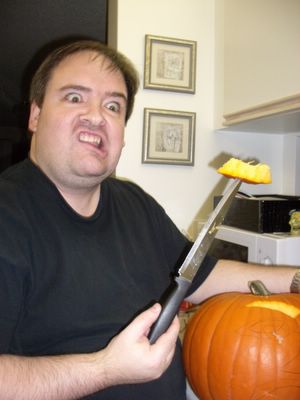
This year, I decided to go big or go home and CARVE SOME EYEBROWS
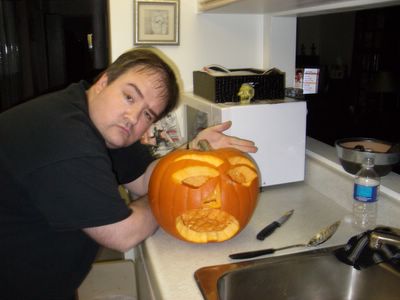
A cut above.

Sylvia bestows a witchy kiss upon the stunned Jack.

Truly, a haunting visage.

It's bad luck to walk under a ladder!

As Karen Black revealed in Trilogy of Terror, nothing is creeper than an action figure taken out of context.


Sylvia and I carved another pumpkin this year.

Sylvia proudly displays this year's sacrfice.

Muah hah hah hah hah

MMMM...BRAINS

This year, I decided to go big or go home and CARVE SOME EYEBROWS

A cut above.

Sylvia bestows a witchy kiss upon the stunned Jack.

Truly, a haunting visage.
Wednesday, October 18, 2006
Knights of the Kitchen Table
All Smiles

Earl J. Woods, Kevin Taft, Sylvia Boucher after a fundraising spaghetti dinner at Edmonton's Italian Cultural Centre.
Labels:
Alberta Liberals,
Kevin Taft,
Photography,
Politics,
Sylvia
Zombies in Calgary
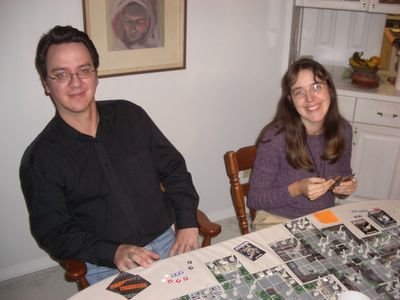
Jeff and Susan prepare for defeat
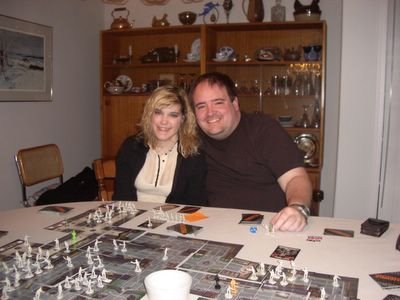
Sylvia prepares for defeat, Earl for victory
On Saturday, Sylvia and I drove down to Calgary to visit Jeff and Susan Shyluk, who were there to visit Jeff's parents. We first enjoyed two rousing games of Nuclear War - a board game from the height of the Cold War era with a darkly mordant sense of humour. Susan "won" the first game, eliminating the populations of all other nations, while everyone lost the second - a not uncommon result in nuclear war.
We then switched to a hard-fought game of Zombies!!!, using the mall, university and army base expansion packs. It was the largest game of Zombies!!! any of us have ever played, with dozens of ghoulish fiends littering the board and blocking all escape routes.

Late in the game it looked like Susan was going to run away with it, but in a last-minute berserker charge, I hacked apart a half dozen zombies and managed to make my escape in the helicopter, leaving my hapless competitors behind to serve as zombie chow.
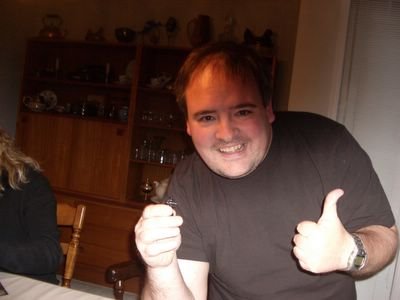
As Wesley Snipes quipped in the legendary Passenger 57, "Always bet on black!" (Note the colour of my game token.)
Labels:
Film,
Games,
Jeff and Susan,
Nuclear War,
Sylvia,
Zombies
Down to a Sunlit Sea

I beheld the choices all arrayed
In rows so neat the truth betrayed
Slipped past the precipice and fell
Tumbled, floated, adrift in cloudless space
Through a violet sky
Looked up and saw those choices recede
Looking down at me with misted eyes
Soundless
Fell without friction
No unquiet wind to disturb my peaceful descent
Down to a sunlit sea
More Earlivators
Labels:
Jeff S.,
Philosophy,
Photography,
Sean,
Silly Nonsense,
University of Alberta Star Trek Club
Tuesday, October 10, 2006
Super Innuendo
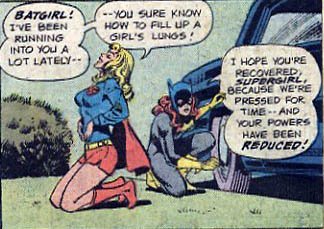
Oh, Batgirl!
"Batgirl! I've been running into you a lot lately - you sure know how to fill up a girl's lungs!"
When I first read the issue of Superman Family that features this breathtaking panel, I was only seven or eight years old, and boy did it make an impression. Look how happy Supergirl is. Look at that pose! It all seems kind of blase to Batgirl, though - like she fills up superheroine lungs all the time.
"I hope you're recovered, Supergirl, because we're pressed for time - and your powers have been reduced!"
Is it just me, or is this panel chock full of subtle double entendres? Maybe I was only seeing what I wanted to see. Maybe I'm still seeing it.
Thursday, October 05, 2006
Do Not Touch the Space Brain
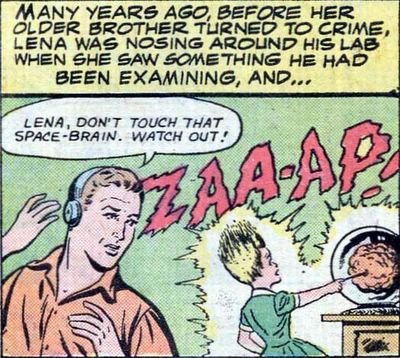
Not many people know that archvillain Lex Luthor has a younger sister, Lena. As seen here, Lex was once a doting older brother, though not quite doting enough to prevent his sister from getting zapped by a space brain. Why Luthor had a space brain in his lab was never explained. Nor did the storytellers ever explain how Luthor obtained a space brain, nor what poor space creature had to do without its space brain to sustain Lex's experiments. In fact, the space brain's one and only appearance is this single panel; it was merely a throwaway plot device to give little Lena telepathic powers.
I wish I lived in a comic book. Touching a space brain in the real world is unlikely to grant you super-powers. Not only that, but what in our world would be the scientific find of all history is treated here like any common lab specimen. Space brain? I have a dozen of those. I store them in the cabinet with the Philosopher's Stone, which I use as a paperweight for my Unified Field Theory.
Labels:
comics,
disembodied brains,
Lena Luthor,
Lex Luthor,
popular culture
Wednesday, October 04, 2006
Atomic Innocence
Labels:
Batman,
Clark Kent,
comics,
Lois Lane,
Nuclear War
Tuesday, October 03, 2006
On Backstabbing
Harper's has posted a fascinating article on how the USA's right wing has used an old German myth explaining the outcome of World War I - that of disloyal elements "backstabbing" patriotic Germans - to win elections and divide the American public. According to the article, they've been doing it since the Second World War, and the chickens may finally be coming home to roost.
Friday, September 29, 2006
Strange New Woods
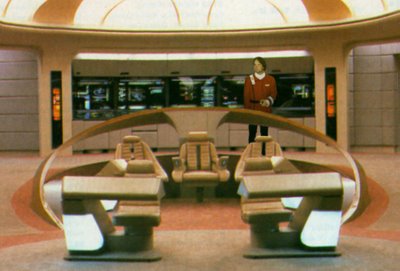
Image Manipulation by Allan Sampson
After saying for ten years that I'd enter Pocket Books' annual Strange New Worlds Star Trek short story contest, I've finally done it. I wrote the story over the course of three very intense nights, sent it to New York via Fed Ex yesterday, and according to the tracking system it arrived at the Pocket Books mailroom today, three days before Monday's deadline.
I have no illusions about my chances of being published in Strange New Worlds 10, but it was great to finally finish a piece of fiction and send it into the hands of unbiased outsiders. The contest results are released on or about December 22nd, so wish me luck.
Labels:
Short Stories,
Star Trek,
The Earliad,
Writing
Wednesday, September 20, 2006
Spock Must (Have) Die(d)!
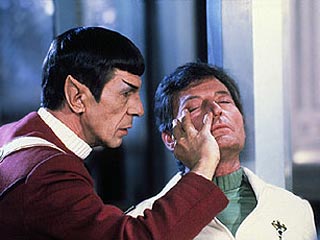
I was thirteen years old when Mr. Spock died, heroically saving the ship in Star Trek II: The Wrath of Khan. It was a powerful experience; for the first time, a character I'd known my entire life had been killed. Suddenly anything was possible.
Until the next movie, of course. Turns out Spock was only mostly dead, and by end of Star Trek III: The Search for Spock, all was right in the world once more. (Well, except for the Enterprise getting blown to smithereens, but that's another kettle of tribbles.)
But consider the course of Spock's death and resurrection. Near the end of Star Trek II, Spock, realizing that he's probably going to die in the act of saving the ship, initiates a mind-meld with his old friend, Dr. Leonard "Bones" McCoy.
"Remember," Spock intones gravely, and enters the reactor room, ready to make the ultimate sacrifice.
We learn in Star Trek III that the mind meld transferred Spock's katra - his soul, or consciousness - into McCoy's brain, so that Spock's essence could be transferred to its rightful home on the planet Vulcan. But as we know from the third film, Spock's corpse was regenerated by the Genesis Wave, and the high priestess of Vulcan was able to reunite Spock's mind and body, and faster than you can say "ye canna change the laws of physics!", the status quo is restored.
For years Star Trek fans have accepted Spock's miraculous return as a given. But a few nights ago I sat straight up in bed and realized that it's quite possible that Spock never really returned at all. Since 1984, the Spock we've seen presented in subsequent films and television shows may have been, in fact, an imposter!
Consider the climax of Star Trek II. Here's the sequence of events:
1) The warp engines have been knocked offline and need to be fixed before the Genesis Device explodes, destroying the Enterprise.
2) Spock realizes that only he has a chance of fixing the warp drive, but that he'll have to sacrifice his life in the process.
3) Realizing this, and wanting something of his essence to live on, he mind-melds with McCoy in the engine room - transferring his consciousness to McCoy.
4) Spock then enters the reactor room, and while bathed in radiation, manages to repair the warp drive.
5) Dying, he has a final, lucid conversation with Admiral Kirk. "The needs of the many outweigh the needs of the few...or the one."
What's wrong with this picture?
At step 3), Spock transfers his soul into McCoy. How, then, can he carry out a complicated repair and then have a heartfelt, deathbed conversation with Kirk?
We are left with only three options.
A) Spock transferred a copy of his consciousness into McCoy. This copy is what was resurrected on Vulcan - the original Spock died in the reactor! For a few moments, there were two Spocks, one lodged in McCoy's mind, the other carrying out the reactor repair and deathbed heart-to-heart.
B) Somehow, Spock's consciousness embedded some kind of automatic pilot function into the body it left behind, enabling the soulless husk to carry on as if it were a conscious being for a few minutes. A zombie saved the ship, and Admiral Kirk wept over that zombie's death, never realizing that the real Spock was just a couple of metres away, inside Dr. McCoy.
C) The "real" Spock left behind a copy of himself in his original body to carry out the reactor repair.
Which option is correct? It's impossible to determine for certain, but consider this: when Spock transferred his consciousness, his aim was not to come back to life. As we learned from Spock's father, Sarek, in the next film, Vulcans transfer their katras only so that their wisdom and experience can be stored in a kind of library for the use of other Vulcans. We can infer that a copy of a Vulcan's katra would be sufficient for this purpose.
Knowing Spock's character, it is unlikely that he would create a copy of himself for the sole purpose of sacrificing itself; such an act would be akin to giving birth to a twin with a built-in death sentence.
Therefore, we must conclude that the katra in McCoy's head was but a copy of Spock's essence, and that the real Spock did in fact die for the sake of his shipmates. The Spock we saw in Star Trek III, Star Trek IV, Star Trek V, Star Trek VI and two episodes of Star Trek: The Next Generation was a biological robot of sorts - or, at best, Spock's twin.
Does it matter? Well, as Spock once said, "A difference which makes no difference is no difference." Pre- and post-Genesis Spock retained the same essential character, taking into account the passage of time and gathering of new experience, and the new Spock certainly would have passed a Turing test, or any other test of his sapience.
And yet I can't help but feel like I've been living a lie since that warm summer night in 1982...the night Spock died, and never came back.
Labels:
Philosophy,
Spock,
Star Trek,
Star Trek II: The Wrath of Khan
Tuesday, September 19, 2006
She Married a Scientist from Inner Edmonton
On July 14, my old friends Jeff and Susan Shyluk arrived in Edmonton to help celebrate the nuptials of our mutual friend and University of Alberta Star Trek Club accomplice, Dr. Michael Snyder, a scientist, to the charming and enigmatic Naomi Littlewood.
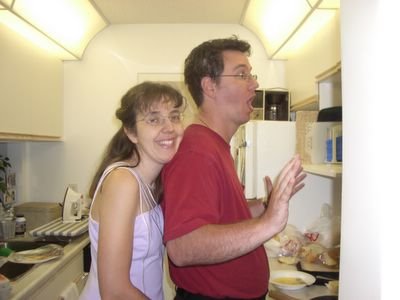
Susan and Jeff Shyluk
On the fateful morning of the 15th, Jeff and Susan kindly made breakfast for Sylvia and I. Once our morning repast was complete, we dressed up, packed ourselves into Jeff and Susan's rental car, and made our way to Inglewood Park, just a few metres distant from my old apartment complex, Baywood Park.
We headed north on 170th street, stopping for a red light just south of the Mayfield Inn. Crossing the avenue before us was a black van towing an orange two-wheel trailer. The trailer looked a little shaky, and I wondered if it were going to come loose of the van's hitch. No sooner had the thought crossed my mind than it changed from idle speculation to grim reality, and the four of us goggled in slack-jawed wonder as the trailer came free of its moorings, bouncing along behind the van, sparks and chips of asphalt flying.
I wondered if the driver of the van was going to stop. Sure enough, he did, and the careening trailer bounced off a curb and smashed into the van's rear with a deafening screech of metal on metal. A bald, husky, puzzled man emerged from the van, bewilderment filling his eyes as he surveyed the damage to his vehicle.
As a devoted lover of slapstick comedy, I couldn't help but laugh. I suppose it would be more accurate to say that I was cackling, despite the sympathy I genuinely held for the man's predicament. Jeff didn't help matters by saying "Where's the trailer?" over and over again in a "puzzled hick" voice.
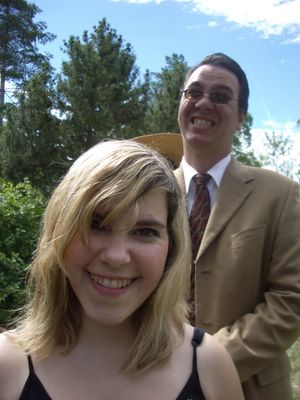
Jeff goes YARRRGH!
That bizarre interlude concluded, we finished the journey to Inglewood park. The wedding ceremony was short and sweet, and featured a lovely quote from the cult film The Princess Bride, a touch I appreciated.
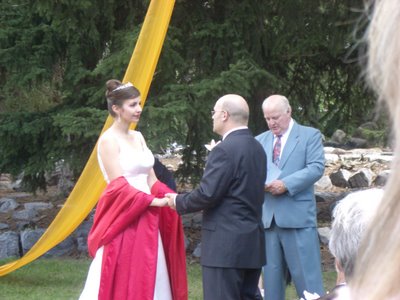

Naomi and Michael with their son Elliot
Here's the newly-sealed couple with their strapping young son, flanked by several members of the bridal party.

Michael and Steven Neumann
Here's the groom and our old friend Steven Neumann, Susan's older brother.
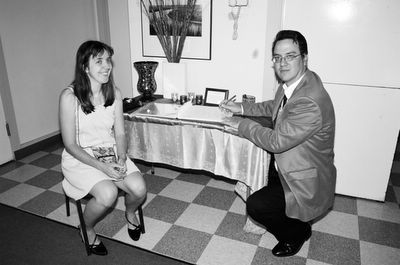
Jeff and Susan at the reception
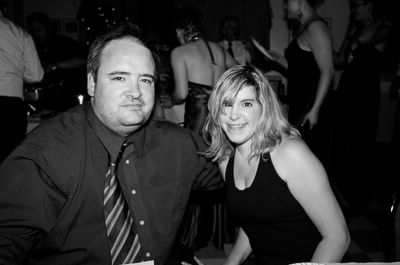
Sylvia and I at the reception
As is usual at these human affairs you Earth people call "weddings," a reception followed the ceremony. Here many carbon units feasted upon the flesh of other carbon units. The flesh was good, far better than you find at most weddings.
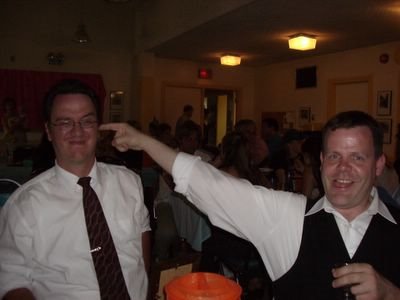
Steven sticks his finger in Jeff's ear
Some of the flesh-sampling rituals puzzled me. But they were entertaining. Foolish Earthlings!
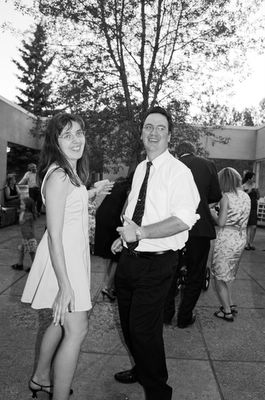
Susan and Jeff boogie
Unfortunately, this wedding also included that aggravating human ritual known as "dancing."
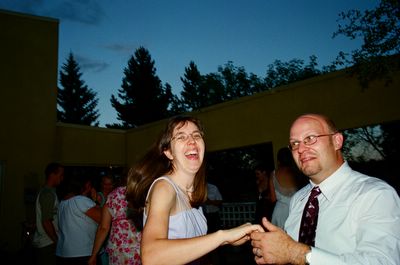
Susan and Michael dance
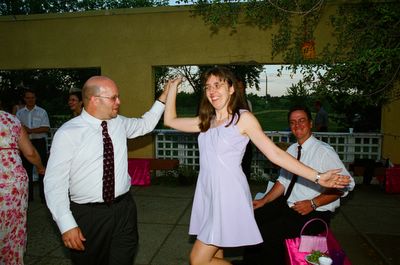
Susan and Michael dance as Jeff looks on
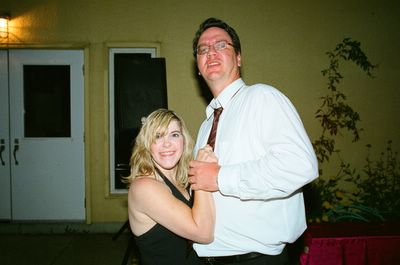
Sylvia and Jeff dance
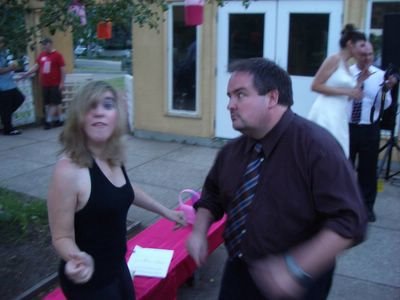
Sylvia and Earl dance
I was unable to avoid participating.
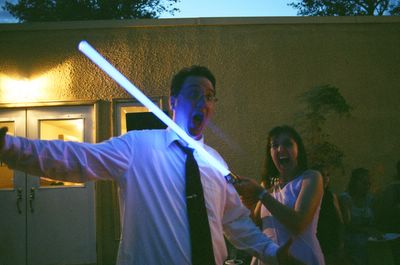
Susan cuts Jeff in twain
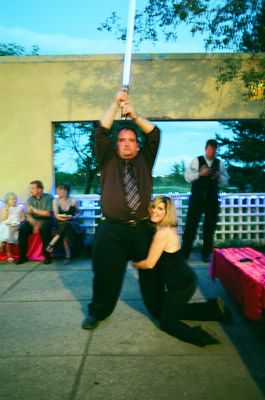
Recognize this pose?
Foolish Earth beings! Your Jedi weapons are no match for the peerless might of me!
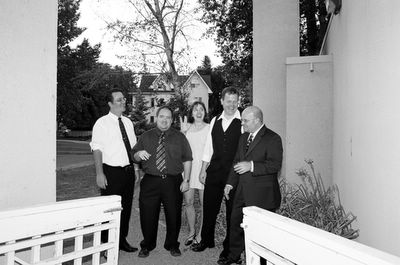
University of Alberta Star Trek Club mini-reunion
Gathered here, some of the membership and executive of the University of Alberta Star Trek Club, circa 1987-1991.
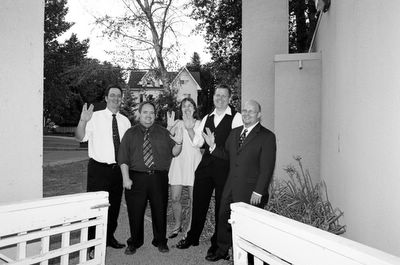
University of Alberta Star Trek Club Secret Salute
We hope that Michael and Naomi's marriage is long and prosperous.
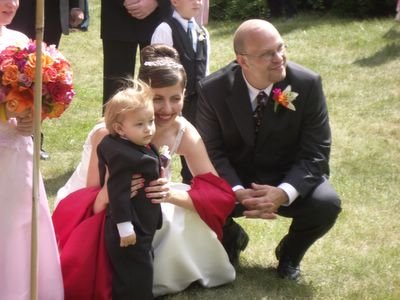
A young family begins its journey

Susan and Jeff Shyluk
On the fateful morning of the 15th, Jeff and Susan kindly made breakfast for Sylvia and I. Once our morning repast was complete, we dressed up, packed ourselves into Jeff and Susan's rental car, and made our way to Inglewood Park, just a few metres distant from my old apartment complex, Baywood Park.
We headed north on 170th street, stopping for a red light just south of the Mayfield Inn. Crossing the avenue before us was a black van towing an orange two-wheel trailer. The trailer looked a little shaky, and I wondered if it were going to come loose of the van's hitch. No sooner had the thought crossed my mind than it changed from idle speculation to grim reality, and the four of us goggled in slack-jawed wonder as the trailer came free of its moorings, bouncing along behind the van, sparks and chips of asphalt flying.
I wondered if the driver of the van was going to stop. Sure enough, he did, and the careening trailer bounced off a curb and smashed into the van's rear with a deafening screech of metal on metal. A bald, husky, puzzled man emerged from the van, bewilderment filling his eyes as he surveyed the damage to his vehicle.
As a devoted lover of slapstick comedy, I couldn't help but laugh. I suppose it would be more accurate to say that I was cackling, despite the sympathy I genuinely held for the man's predicament. Jeff didn't help matters by saying "Where's the trailer?" over and over again in a "puzzled hick" voice.

Jeff goes YARRRGH!
That bizarre interlude concluded, we finished the journey to Inglewood park. The wedding ceremony was short and sweet, and featured a lovely quote from the cult film The Princess Bride, a touch I appreciated.


Naomi and Michael with their son Elliot
Here's the newly-sealed couple with their strapping young son, flanked by several members of the bridal party.

Michael and Steven Neumann
Here's the groom and our old friend Steven Neumann, Susan's older brother.

Jeff and Susan at the reception

Sylvia and I at the reception
As is usual at these human affairs you Earth people call "weddings," a reception followed the ceremony. Here many carbon units feasted upon the flesh of other carbon units. The flesh was good, far better than you find at most weddings.

Steven sticks his finger in Jeff's ear
Some of the flesh-sampling rituals puzzled me. But they were entertaining. Foolish Earthlings!

Susan and Jeff boogie
Unfortunately, this wedding also included that aggravating human ritual known as "dancing."

Susan and Michael dance

Susan and Michael dance as Jeff looks on

Sylvia and Jeff dance

Sylvia and Earl dance
I was unable to avoid participating.

Susan cuts Jeff in twain

Recognize this pose?
Foolish Earth beings! Your Jedi weapons are no match for the peerless might of me!

University of Alberta Star Trek Club mini-reunion
Gathered here, some of the membership and executive of the University of Alberta Star Trek Club, circa 1987-1991.

University of Alberta Star Trek Club Secret Salute
We hope that Michael and Naomi's marriage is long and prosperous.

A young family begins its journey
Labels:
Jeff and Susan,
Michael and Naomi,
science,
The Princess Bride,
University of Alberta Star Trek Club
Subscribe to:
Posts (Atom)

